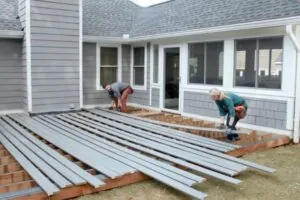
If you’re envisioning a brand-new deck as the crown jewel of your Texas home, understanding the ins and outs of deck building permits should be your starting point. Texas regulations can be strict, and skimping on the permit process might lead to costly consequences down the line.
Whether it’s a cozy spot for your morning coffee or an expansive outdoor haven for entertaining, securing the proper documentation is key to turning your vision into a reality. It’s not just about following rules; it’s about ensuring the safety and longevity of your construction project. For those considering adding a porch or a deck, understanding the deck design and installation process is essential.
I. When Do You Need a Permit?
In Texas, determining whether a deck building permit is needed hinges on several key factors that homeowners should be well-informed about to ensure their project adheres to local regulations.
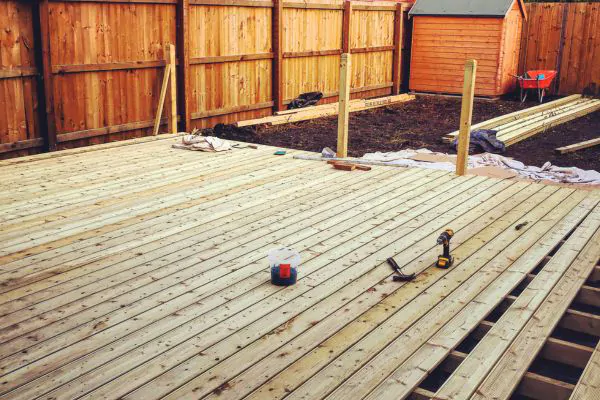
A. If Your Deck Connects to Your House
In Texas, homeowners planning to build a deck attached to their home usually need a permit. This is because adding a structure to a home can affect its stability. Getting a permit ensures that the design and construction follow safety standards.
B. Size and Location Matter
The size and where a deck is built are important factors in deciding if a permit is needed. If a deck is too big or built in certain areas, like near property lines or conservation areas, authorities will probably require a permit. Homeowners need to know these rules to avoid problems with regulations or neighbors.
C. What Your Deck Will Be Used For
The functional intent behind the construction of a deck can play a significant role in the permit acquisition process. Decks for a household may need fewer permits than decks for big gatherings, which could face more scrutiny because of their impact on structure and the neighborhood.
D. Size of Your Deck
In Texas, the size of a deck determines if a permit is required. Larger decks are more regulated due to safety and environmental concerns. Homeowners should check with local authorities for specific size requirements, but generally, decks over 200 square feet need a permit in Texas. It’s important to review building codes before starting construction to avoid fines or legal problems.
Related Post: How Much Does It Cost To Build A Front Porch
II. Types of Permits Based on Deck Sizes
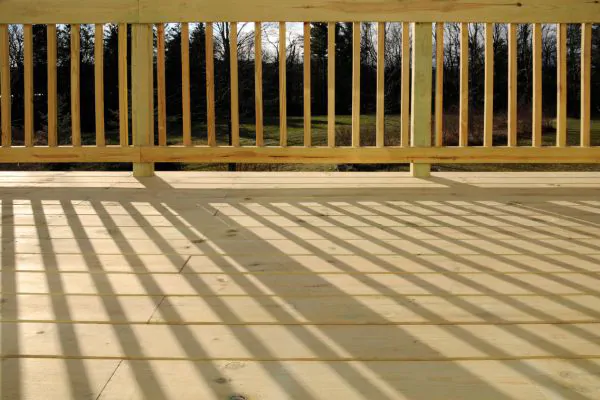
Securing the right permit hinges on the size of the deck homeowners intend to build. Texas regulations offer a tailored approach, providing a spectrum of permits aligning with various deck dimensions.
The criteria distinguishing a small deck from a large one is crucial as each category has its own set of regulations and corresponding permits. These range from exemptions for small structures to more comprehensive permits for outdoor spaces.
A. Small Decks: No Permit Needed
In Texas, some small decks can be built without a permit if they are not attached to the home and are below a certain size. It’s important to check with local building authorities before starting. Minor additions and work done to the home generally do not impact it enough to require a permit in most areas of Texas.
B. Medium-Sized Decks: General Repair Permit
For decks that straddle the line between a simple platform and an expansive outdoor venue, Texas may offer what’s known as a general deck repair permit. Medium-sized decks need this permit to ensure they meet safety and design standards set by local building codes, even though they are not as big as larger ones.
C. Large Decks: Residential Building Permit
When it comes to constructing a large deck in Texas, the path forward involves obtaining a residential building permit. This authorization is very important for large deck projects that are bigger than the size limits for smaller decks. It ensures that the deck follows all the building codes and safety rules, which keeps the homeowner safe and makes the inspection process easier after the deck is finished.
You might like: How Much Does It Cost To Install A Deck?
III. How to Get a Permit
Navigating the path to obtaining a deck building permit in Texas is a critical step in the construction process. The journey begins with identifying the appropriate local authority responsible for issuing permits.
Homeowners are tasked with compiling all necessary documentation including deck building plans for permit consideration and a detailed list of materials and construction details.
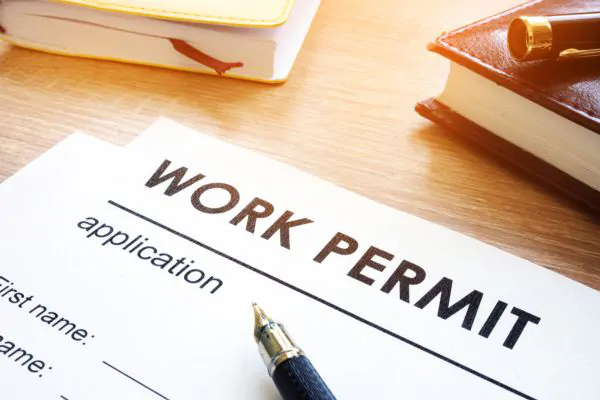
A. Finding Who Gives Them Out
Getting a permit for a deck in Texas involves finding out which local authority is in charge of construction projects in your area. Usually, this is the city or county building department. Homeowners can contact them to get information and start the process of getting a permit for their deck.
B. What Papers You Need
In Texas, to get a permit, you need to show deck building plans, proof of property ownership, and any approvals from city planning or zoning committees. It’s crucial for deck builders to verify they have acquired and filled all necessary forms accurately to avoid any setbacks or delays in the evaluation of their construction proposal.
C. Step-by-Step Process for Applying
The journey to securing a deck building permit begins with a visit to the local building department where homeowners can request an application packet. During this step, clear communication is essential to understand each part of the form and the documentation that needs to be attached with it. Once the forms are filled out and the plans are made, the homeowner needs final approval for the work. An inspector may visit beforehand or ask for more information in order to give the go-ahead.
IV. Why Your Permit Might Get Rejected
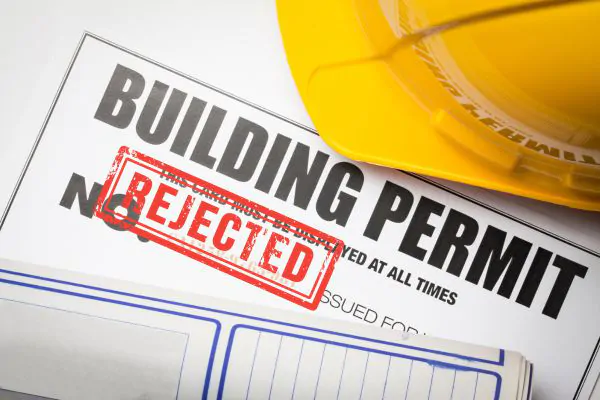
Even with proper preparation, individuals may encounter challenges when applying for deck building permits.
Common reasons for permit rejection stem from various oversights or noncompliance with specific regulations.
Notably, providing insufficient detail within deck building plans can hinder the approval process.
Additionally, presenting designs that have underlying structural issues or do not meet the stringent requirements for earthquake safety will likely result in a permit being denied.
Recognizing these potential pitfalls is key in avoiding unnecessary delays in the deck construction process.
A. Not Enough Detail in Your Plans
A permit application for deck construction in Texas can be rejected if the submitted plans lack comprehensive details. Incomplete plans might lack crucial details such as weight support, precise measurements, or required materials, raising concerns about the deck’s strength. Builders must provide comprehensive plans for inspectors to ensure compliance.
B. Structural Issues
When a permit application is under review in Texas, structural integrity is a primary focus. Permit proposals may be denied if they reveal potential weaknesses that could compromise the deck’s longevity or safety. Issues like wrong footing depths, not enough space between joists, or using materials that don’t meet the rules can cause a permit application to be denied. Homeowners need to make sure their deck plans follow the rules for their area to handle the local weather and
C. Meeting Earthquake Safety Standards
In Texas, where earthquake risk may not be as prominent as in other regions, deck construction must still adhere to universal safety codes that include provisions for seismic activity. If deck building plans overlook unexpected safety standards, the permit might be denied. It’s crucial to consider all stability and durability aspects during the design process.
V. Tip for Success, Talk to Local Deck Experts Early
Engaging with seasoned deck professionals early in the planning stage is an astute move for any Texas homeowner. These experts can provide invaluable insights into the complexities of local permit requirements and the nuances of suitable deck design. Their familiarity with regional preferences, weather considerations, and code specifics can set a solid foundation for a project’s success.

Local deck builders like All Pro CS Decks are skilled at getting permits and ensuring everything is done according to local codes and building regulations. They have the reputation and connections needed to speed up the process, avoid mistakes, and prevent delays. Their expertise ensures homeowners don’t have to deal with complex regulations alone.
Considering Texas’ diversity in building regulations that vary from one city to another, consulting with local deck experts can save significant time and resources. Their expertise in crafting compliant deck building plans for permit approval is fundamental. Homeowners can benefit greatly from such partnerships, ensuring their deck’s construction is up to code and permit ready.
FAQs: Deck Building Permits in Texas: Things You Need to Know
1. What are the rules for decks in Texas?
In Texas, deck regulations depend on size, height, and location. A permit is usually required if a deck is over 30 inches high, attached to a home, or larger than 200 square feet. Local building codes ensure structural integrity, proper footings, and safety railings. Homeowners must also follow setback rules, providing the deck is not too close to property lines. Always check with local authorities before building.
2. What do I need for a deck permit?
You will need detailed building plans outlining dimensions, materials, and structural support to obtain a deck permit in Texas. You must apply to your city or county’s building department, pay the required fees, and possibly provide a site plan showing deck placement. In some areas, an inspection is needed before, during, and after construction to ensure the deck meets safety and zoning regulations.
3. What happens if you get caught without a building permit in Texas?
Building a deck without a required permit in Texas can result in fines, legal action, and forced removal of the structure. Homeowners may also face delays in selling their homes, as unpermitted work can cause issues with inspections and appraisals. In some cases, you may need to retroactively obtain a permit, which could involve additional fees and modifications to bring the deck up to code.
4. Do I need a permit to build a floating deck in Texas?
A floating deck (not attached to a home and typically under 30 inches high) may not require a permit in some Texas areas. However, rules vary by city and county, so checking local regulations is essential. A permit may still be necessary if the deck exceeds 200 square feet or is built in a regulated area. Always verify with local authorities before construction to ensure all requirements are met.

